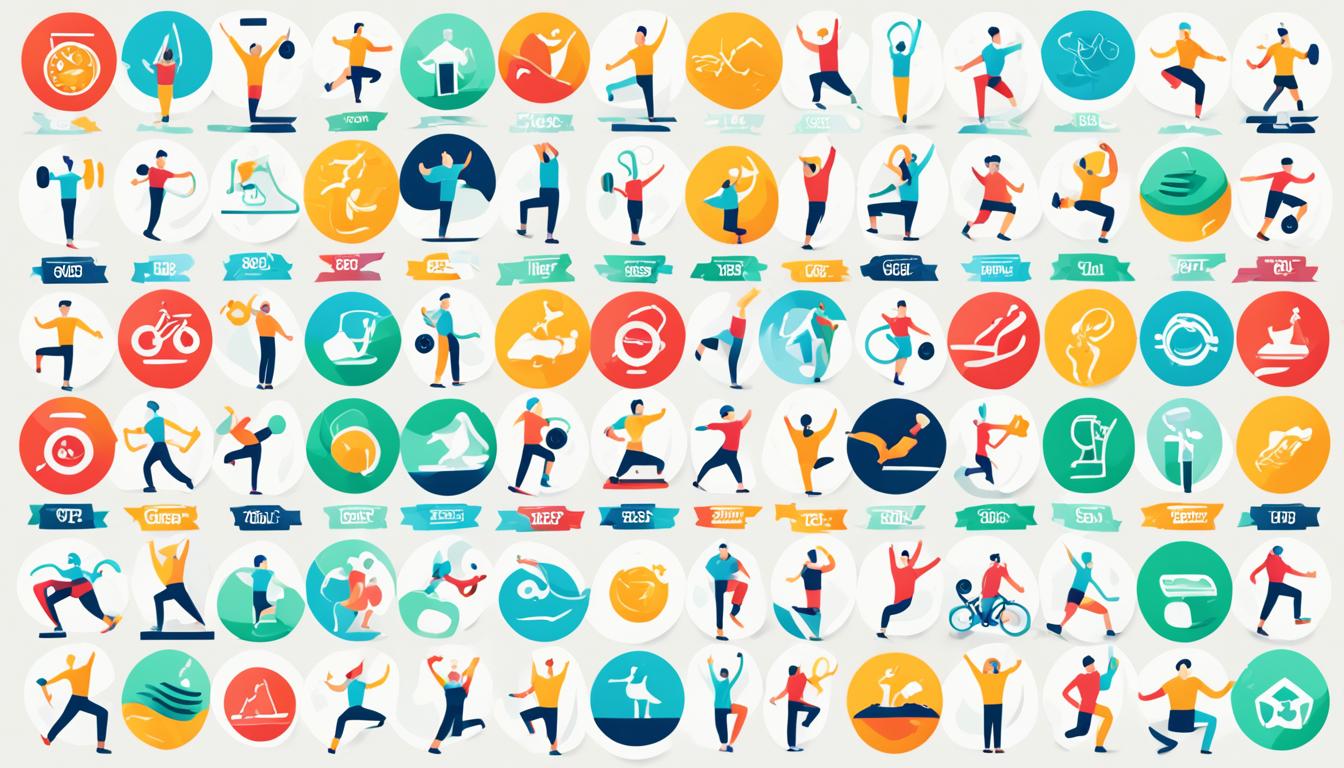Starting weekly wellness challenges can change your life and work for the better. They cover sleep, drinking water, moving more, and keeping your mind sharp. These challenges help you and your coworkers feel better and work better too.
Wellness programs and wellness initiatives, including weekly wellness challenges, are becoming increasingly popular in workplaces. These comprehensive wellness programs aim to engage employees in activities that support physical, mental, and emotional well-being.
There are 52 wellness challenges you can try at work. You can try sleeping 7-9 hours a night or not eating after 8 PM. There are also challenges to keep you active, like planking or walking to meetings.
These challenges last for weeks and help make healthy habits last. For example, drinking 64 ounces of water a day can start in January. Getting 7-8 hours of sleep each night can be the focus in February.
Other challenges include Meatless Mondays, journaling what you’re thankful for, and doing stretching exercises. These help you stay healthy all year round.

Key Takeaways
- 52 wellness challenge ideas can be implemented within a company’s workforce.
- Encourages healthy habits and supports employee engagement and productivity.
- Examples include sleep challenges, hydration goals, physical activity routines, and kindness initiatives.
- Employee wellness challenges generally last several weeks and can be both regular and one-time activities.
- Creating a culture of health benefits personal development and overall workplace health.
Introduction to Wellness
Wellness is more than just the absence of illness—it’s a holistic approach that brings together physical, mental, and emotional well-being. By focusing on healthy habits and daily practices, you can boost your overall health and quality of life. Wellness challenges are a fun and effective way to encourage people to prioritize their well-being, whether at home or in the workplace.
In the workplace, wellness challenges can be a game-changer. They help employees develop healthy eating habits, increase physical activity, and manage stress, all while building a supportive company culture. When organizations introduce workplace wellness challenges, they not only improve employee health but also see benefits like higher productivity and lower healthcare costs. These challenges inspire everyone to take small steps toward better health, leading to lasting improvements in well being, emotional well being, and overall health.
By making wellness a priority, you can create a positive environment where healthy habits thrive and everyone feels empowered to take charge of their health.
Benefits of Participation
Taking part in wellness challenges offers a wide range of benefits for both individuals and organizations. For employees, these challenges can lead to improved physical and mental health, higher energy levels, and a greater sense of overall well-being. Wellness challenges are also a great way to reduce stress, as they encourage healthy habits like regular exercise, balanced nutrition, and mindfulness.
Beyond the health benefits, wellness challenges foster social interaction and team building. When employees participate together, it creates a sense of community and support, which can boost mental health and help everyone feel more connected. These challenges also provide opportunities for personal growth, as participants learn new skills and develop routines that support long-term health.
For organizations, encouraging employees to join wellness challenges helps promote a culture of wellness, leading to happier, healthier, and more engaged teams. Over time, these positive changes can result in lower absenteeism, increased productivity, and a stronger commitment to overall health and well being.
Setting Up a Wellness Challenge
Launching a successful wellness challenge starts with clear planning and thoughtful design. Begin by defining the goals and objectives of your wellness challenge—do you want to focus on physical health, mental health, or even financial wellness? Next, identify your target audience and choose a challenge that matches their interests and needs.
Wellness challenges can be tailored to address specific areas, such as increasing physical activity, improving nutrition, or supporting stress management. Consider the level of difficulty and the type of support participants might need to succeed. A successful wellness challenge should be engaging and motivating, with clear guidelines and achievable milestones.
To boost participation, offer incentives and rewards for reaching goals, and make sure to communicate the benefits of joining. Providing resources, such as tips for healthy eating or stress management, can help everyone stay on track. By creating a supportive environment, you’ll help employees achieve their health and wellness goals and build a culture that values well being and personal growth.
Sleep Challenge: Improve Rest and Productivity
Getting enough sleep is key for feeling good and being productive. The U.S. Centers for Disease Control and Prevention say over a third of Americans don’t sleep well. Starting a sleep challenge can make sleep better and boost daily productivity.
By making these changes part of your daily routine, you can reinforce better sleep habits and support your overall well-being.
Importance of Quality Sleep
Good sleep is vital for staying healthy. It helps with thinking and feeling good. The National Sleep Foundation says adults need at least seven hours of sleep each day.
Keeping your bedroom cool, between 65 and 72 degrees Fahrenheit, helps you sleep better. Going to bed and waking up at the same time every day also helps. This makes your sleep patterns better and improves sleep quality.

How to Track Your Sleep
Tracking sleep is key to improving it. There are many apps and devices that can track how well you sleep. They look at sleep cycles, how long you sleep, and any disruptions.
This info is important for finding out what affects your sleep. It helps make plans to sleep better.
Setting Sleep Goals
Having sleep goals is important for getting better sleep. These goals could be going to bed at the same time every night, having a bedtime routine, or keeping your room cool. Doing relaxing things before bed, like taking a warm bath, can help you sleep.
Keeping your sleep area comfortable, like getting a new mattress and pillows, also helps. By following these goals, you can do more in your daily life.
- Tracking sleep with apps or devices
- Maintaining a consistent sleep schedule
- Creating a calming bedtime ritual
- Adjusting room temperature for optimal sleep
- Replacing old mattresses and pillows for better support
Using these tips can make you sleep better and feel better overall. It can also make you more productive.
Hydration Challenge: Drink More Water
Drinking enough water is key for good health. Taking a hydration challenge can bring many health perks. We’ll share tips on drinking more water and how to track your progress.
Benefits of Staying Hydrated
Drinking water helps your brain work better, your digestion, and your skin look good. It stops headaches and makes you feel better overall. Women need 70 to 90 ounces of fluids a day. Men should aim for 100 to 125 ounces.
Water-rich foods like watermelon, strawberries, and lettuce also help you stay hydrated.

Tips for Increasing Water Intake
It’s easy to drink more water. Here are some easy tips:
- Refill your glass right after you finish it.
- Drink a glass of water in the morning and before bed.
- Set alarms to remind you to drink water all day.
- Eat fruits and veggies to naturally increase your water intake.
- Use different colored and shaped water bottles to make it fun.
Drink four to eight ounces of water every 20 minutes when you exercise. Keep water handy during flights, vacations, and hot days. Drink water first, then other drinks.
Tracking Your Progress
Use apps like Waterlogged, Fitbit, iHydrate, or Hydro Coach to track your water. These apps help you set goals and remind you to drink. Try the 30-Day Water Challenge by adding one more glass of water each day.
Watch out for signs of dehydration like thirst, dizziness, and dark urine. Keeping a water log or using a Water Reminder app can help you track your water intake.
Weekly Challenges to Keep You Moving: Fitness Goals
Setting fitness goals like daily step counts and core strengthening can boost your health. Participating in a steps challenge or a stairs challenge are popular workplace activities that encourage movement and engagement. These activities improve your heart health and overall well-being. Physical challenges can be tailored to different fitness levels, making them accessible and inclusive for everyone. Fitness challenges also help your mind, making 95% of people feel better. Physical fitness is a key component of overall wellness, and these challenges can be part of a broader fitness program to support healthy habits.
Daily Step Count Challenge
Increasing your daily steps is a great way to be more active. Many companies use this challenge to improve health and teamwork. Start with a goal and increase it each day to stay motivated.
Employers can encourage walking meetings and lunch breaks to help teams meet their goals.
- Fitness challenge ideas
- Use wearable devices to track your steps accurately
- Make it fun with leaderboards that support everyone
Planking for Core Strength
Core strengthening is key for better balance and posture. A plank challenge can make things fun and bring people together. Start with easy planks and make them harder as you go.

Planking is a great way to build muscle without needing much gear. Doing it regularly can make you more productive at work.
Exercise Minutes Tracker
Tracking your exercise minutes helps you stay fit. It’s good to do short or long workouts regularly. Apps can help you keep track and reach your fitness goals.
Type of ChallengeBenefitsStep ChallengeImproves cardiovascular health, increases daily activityCore Strengthening (Planking)Enhances balance, posture, and core muscle strengthExercise Minutes TrackerEncourages consistent exercise, boosts overall fitness
Seeing your progress can really motivate you. Check out fitness challenge goals to find ways to track your progress. Many people feel better at work when they join fitness challenges.
No Eating After 8 PM Challenge
Starting the no eating after 8 PM challenge can help with healthy eating habits, weight management, and better digestive health. This challenge encourages healthier eating habits and making healthy food choices, supporting your overall wellness. A 2019 study found eating more calories in the morning can cut the risk of obesity by almost half. But eating late can lead to more calories, worse diets, and health problems like obesity and diabetes.

Eating late can make you eat more unhealthy snacks. This can hurt your weight management and health. This challenge can help people lose weight or maintain a healthy weight. Cognitive behavioral therapy (CBT) helps with binge eating disorder. Relaxation techniques like progressive muscle relaxation (PMR) help with night eating syndrome (NES).
Changing when you eat to daylight hours can improve digestive health and help you sleep better. A 2019 review suggests eating during daylight for 8–12 hours. If you still feel hungry at night, eating high-protein meals can cut cravings by 60% and eating at night by 50%.
Choosing healthy snacks like fruits, nuts, and veggies helps your health and weight management. Doing yoga, journaling, or a short walk can distract you from eating out of boredom. This improves sleep and emotional health.
Following the no eating after 8 PM rule and better late-night habits can lead to better sleep. It helps your body digest food before bed and lowers the risk of indigestion. Over time, you’ll feel more energized, refreshed, and have a better quality of life.
- Limit food consumption to between 8 AM and 8 PM.
- Choose high-protein meals to reduce night cravings.
- Opt for healthier snack alternatives.
- Engage in relaxing activities to prevent habitual late-night snacking.
- Notice improvements in sleep and overall well-being.
Reading Challenge: Enhance Your Mind
Joining a reading challenge brings many reading benefits. It boosts your mind and grows your knowledge. The Charles Town Library’s “All the Feels” challenge is a great example. It asks you to read for at least 900 minutes.
This challenge helps you read more often. It sets goals that are easy to reach. Reading challenges can also be seen as learning challenges that help participants develop a new skill, making reading a regular part of your life.
Many scientists say reading goals make you read more. Reading every day can make your mind sharper. It can also make you more creative and analytical. Setting personal goals for reading can motivate you to keep participating and achieve your own milestones.
Reading for just thirty minutes a day can also make you feel less stressed. This is good for your body and mood.
Studies show that reading fiction makes you more empathetic. It helps you understand others better.
Reading challenges also bring people together. For example, finishing the “All the Feels” challenge could win you prizes. You could get items from places like The Hobbies Shop, River Riders, and Boxwood Estate Winery.
This makes reading more fun and builds community bonds.
Here’s a table that shows how many books elementary students read in a month. It also shows how reading helps them grow:
CategoryStatisticsBooks/month3-5Vocabulary Increase15%Comprehension Skills20% ImprovementCritical Thinking25% Increase
There are many types of reading challenges. Some focus on different genres or book clubs. Each type can make reading a fun part of your day.

In conclusion, reading challenges are great for your mind. They help you grow intellectually and keep your mind sharp. With so many books out there, there’s always something new to discover.
Meditation Challenge: Focus and Relaxation
Starting a meditation challenge can make you more focused and relaxed. It brings many meditation benefits that make it a good daily habit. With mindfulness and regular practice, you’ll see big changes in your life, as meditation challenges promote mindfulness and support mental well being.
Meditation is also a form of self care, helping you manage stress and improve your overall health.
Incorporating positive affirmations into your meditation practice can further enhance mental well being.
Benefits of Meditation
Meditation is great for your mind and body. It helps you focus better and relax more. In a 30+ day challenge, people like O’Donoghue felt calmer and more purposeful.
Regular meditation helps you act on purpose, not just react. This leads to better control over your feelings and knowing yourself better.
Meditation benefits are clear; starting with it after waking up sets a calm and focused day.
How to Start Meditating
Starting meditation is easy. Just 10 minutes a day can change a lot. The person in the challenge found success with daily practice, not using apps.
Many people prefer meditating in the morning. It helps them concentrate and pay attention better.

For guided sessions, try apps like Headspace, Journey LIVE Group Meditation, Breathe (Apple Watch only), and Calm.
Tracking Your Meditation Practice
Tracking your meditation is very important. It helps you stay on track and see how far you’ve come. Many people saw big improvements by keeping a record of their sessions.
Relaxation and mindfulness go hand in hand with tracking and sticking to it. People in challenges also suggest supplements like magnesium L-threonate, Apigenin, L-Theanine, Creatine, and Omega-3 Fatty Acids for better brain function, sleep, and recovery.
Join this month’s challenge. Commit to daily meditation, track your progress, and see how it improves your life.
Fruit-Eating Challenge: Boost Your Vitamins
Eating more fruits can really help you get more vitamins. This can make your diet better. Adding different fruits every day can bring big health benefits.
Benefits of Fruits
Fruits are full of vitamins, minerals, and antioxidants. Eating them often can boost your vitamin levels. This supports healthy eating and improves nutrition. Here are some key benefits:
- High in essential vitamins like Vitamin C, A, and K.
- Rich in fiber, aiding in digestion and promoting gut health.
- Natural antioxidants that boost the immune system and fight inflammation.
- Helps reduce the risk of chronic diseases like heart disease, stroke, and certain cancers.
- Low in calories and fats, making them a perfect addition for weight management.
- These fruit benefits show why fruits should be a big part of your diet.
Different Ways to Incorporate Fruits
Adding fruits to your meals can be fun and tasty. Here are some ways to make sure you get the most benefits:
- Add fresh berries or banana slices to your morning cereal or yogurt.
- Blend fruits like mangoes, pineapples, and berries for a refreshing smoothie.
- Include apple or pear slices in your spinach or kale salads for a sweet crunch.
- Snack on whole fruits like oranges, grapes, or plums during the day.
- Make a fruity salsa with diced peaches, avocados, and tomatoes for a tangy touch.
Frozen and canned fruits are also good for you. They keep all their nutrients. They’re a great choice when fresh fruits are hard to find.
“Consuming 400 grams of fruits and vegetables daily, or five servings of 80 grams, is generally recommended for optimal health.”
Adding these servings to your diet can lower the risk of heart diseases, strokes, and cancers. For even better health, try for 800 grams or 10 daily servings of fruits and vegetables.
Random Act of Kindness Challenge
Doing kind things can change lives, making both the giver and the receiver feel better. It helps build a positive place and makes everyone feel good. By joining a Random Act of Kindness Challenge, you can show you care, motivate others, and help your community or work feel more supportive.

Why Kindness Matters
Kindness builds a positive world, making people feel important and connected. It lifts up those who receive it and makes the giver feel better too. At work, being kind can make teams work better together, improve everyone’s mood, and make jobs more enjoyable.
Doing kind things often makes people feel like they belong and boosts their wellbeing. Events like the Virtual Festival of Giving and the Great Kindness Challenge push people to be kind. They show how important caring and understanding are.
Ideas for Random Acts of Kindness
There are many ways to join a kindness challenge. Here are some easy ideas:
- Join the 30 Days of Kindness Challenge or the 28 Days of Kindness Challenge in February.
- Use reflection questions after doing kind things every day.
- Gather supplies like printed challenge lists, sidewalk chalk, books to give away, quarters, popcorn, birdseed, and boxes.
- Read books like ”Ordinary Mary’s Extraordinary Deed” and ”The Kindness Quilt” to get inspired to be kind.
- Help a local food shelf every month as a family tradition.
- Do kindness challenges at school with the Great Kindness Challenge or celebrate Random Acts of Kindness Day.
- Try any of the 51 kindness ideas for yourself, or focus on 30 acts for the workplace.
- Get kids to do 29 acts of kindness.
- Do things for the planet, like reuse items or cut down on plastic.
- Spread kindness through writing, like letters, notes, or comments online.
- Plan community events, like clean-ups or supporting local shops.
- Make your relationships stronger by sharing stories or spending time with family.
Doing these things often can really make kindness a big part of our lives. It helps make our communities and workplaces better for everyone.
Staying Motivated and Engaged
Keeping motivation high is key to making any wellness challenge a success. Encourage participants to set realistic goals and track their progress, celebrating small wins along the way. Regular feedback and support can make a big difference, helping everyone stay focused and inspired.
Make your wellness challenge fun and interactive by including team-based activities, friendly competitions, or group fitness classes. Social interaction and community engagement are powerful motivators, helping participants feel connected and supported. Offering incentives and rewards for participation and achievement can also boost engagement and make the challenge more exciting.
Don’t forget to provide helpful resources, such as healthy recipes, fitness tips, and stress management techniques. These tools can empower participants to overcome obstacles and stay committed to their health goals. By fostering a sense of camaraderie and providing ongoing support, you’ll help everyone stay motivated and engaged throughout the challenge.
Overcoming Obstacles and Staying on Track
Every wellness challenge comes with its own set of obstacles, whether it’s a busy schedule, lack of motivation, or limited support. To help participants overcome these challenges, it’s important to offer practical tools and resources—think fitness classes, healthy meal ideas, and stress management strategies.
Organizations can further support employees by providing incentives, such as gift cards, fitness trackers, or extra time off, to reward participation and achievement. Regular check-ins and progress tracking can help identify when someone needs a little extra encouragement or guidance.
By creating a supportive and encouraging environment, you empower participants to push through setbacks and stay focused on their health goals. With the right resources and a strong sense of community, everyone can overcome obstacles, stay on track, and make lasting improvements to their health and well being.
Conclusion
Adding weekly wellness challenges to your life can lead to big changes. It can help you sleep better, drink more water, exercise every day, and meditate. These challenges bring many health benefits, like being more productive and clear-headed.
Looking back, these challenges show how much you’ve grown. They help you understand your health and work better. This way, you make smarter choices and do better in life.
As we end this wellness review, we encourage you to think about these changes. By trying these challenges, you can improve your health and work better. The aim is to make habits that make life better. So, start today and make a positive change in your life.
FAQ
What are the benefits of incorporating weekly wellness challenges?
Weekly wellness challenges boost personal and work health. They help build healthy habits, make people more productive, and get employees more involved. By focusing on sleep, drinking enough water, moving more, and keeping your mind sharp, you can feel better overall.
How does a Sleep Challenge improve rest and productivity?
Good sleep makes you more productive and happier. A Sleep Challenge helps you focus on getting enough rest. It suggests sleeping 7-9 hours a night and tracking your sleep to learn more about it.
What are some practical ways to stay hydrated?
Drinking enough water is key for avoiding headaches and feeling good. You can drink more water by setting reminders, carrying a water bottle, and aiming for 64 ounces a day. Keeping track of your water intake helps you stay hydrated all day.
How can daily step count challenges enhance physical wellbeing?
Daily step challenges get you moving and keep your heart healthy. Setting goals for steps encourages you to stay active. Workplaces can also support this by having walking meetings.
What is the purpose of a No Eating After 8 PM Challenge?
Eating after 8 PM can hurt your digestion and weight control. A challenge to stop eating at 8 PM can help you stay healthy. You can adjust this time to fit when you go to bed.
How can a reading challenge benefit intellectual growth?
A reading challenge keeps your mind sharp and helps you learn new things. By reading a certain amount regularly, you can make reading a daily habit. This can make you smarter and more knowledgeable.
What are the benefits of meditation and how can one track progress?
Meditation makes you more focused, relaxed, and mindful. Starting a meditation challenge can help you get into this habit. Using apps for meditation helps you track your progress and stay consistent.
Why is incorporating more fruits into the diet important?
Fruits are full of vitamins and nutrients that are good for you. Eating more fruits can be part of a challenge. Creative ways to add fruits to your meals can help you eat better for a long time.
How do random acts of kindness impact social wellbeing?
Doing kind things in your work or community makes everyone feel better. A challenge to be kind keeps it in your mind. This leads to a more supportive and connected place to be.

More Posts
The Importance of Work Planning for Success
Planning your work is key in today’s fast world. Dr. Siraj Dokadia said, “if you fail to plan, you plan to fail.” This shows how important planning is for your career and personal growth....
Top 8 Best Digital Time Planners for Students
In today’s fast-paced digital era, having a reliable time planner for students is essential for those looking to boost their academic success. With many options available, choosing the perfect digital planner can be...
13 Lessons from 'Can't Hurt Me' to Beat Procrastination
Procrastination often blocks people from reaching their goals. In "Can’t Hurt Me," David Goggins shares how to beat it. He uses his own story to show the power of mental strength, good planning, and a...
Master Productive Blogging- Efficient Learning In Less Time
Many bloggers lack productive blogging and feel like they don’t have enough time. There are 8,760 hours in a year, but distractions waste lots of them. Social media—including platforms like Facebook—is a big...